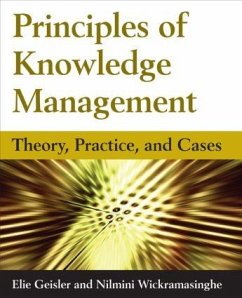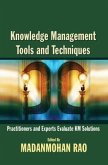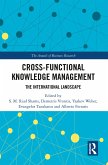Eliezer Geisler, Nilmini Wickramasinghe
Principles of Knowledge Management
Theory, Practice, and Cases
Eliezer Geisler, Nilmini Wickramasinghe
Principles of Knowledge Management
Theory, Practice, and Cases
- Broschiertes Buch
- Merkliste
- Auf die Merkliste
- Bewerten Bewerten
- Teilen
- Produkt teilen
- Produkterinnerung
- Produkterinnerung
This text provides a comprehensive introduction to thenew field of knowledge managament. It approaches the subject from a management rather than a highly technical point of view, and provides students with a
Andere Kunden interessierten sich auch für
![The Foundations of Management Knowledge The Foundations of Management Knowledge]() Paul Jeffcutt (ed.)The Foundations of Management Knowledge48,99 €
Paul Jeffcutt (ed.)The Foundations of Management Knowledge48,99 €![Knowledge Management in the Public Sector Knowledge Management in the Public Sector]() David E McNabbKnowledge Management in the Public Sector59,99 €
David E McNabbKnowledge Management in the Public Sector59,99 €![Intellectual Capital and Knowledge Management Intellectual Capital and Knowledge Management]() Federica RicceriIntellectual Capital and Knowledge Management60,99 €
Federica RicceriIntellectual Capital and Knowledge Management60,99 €![Knowledge Management Tools and Techniques Knowledge Management Tools and Techniques]() Madanmohan RaoKnowledge Management Tools and Techniques114,99 €
Madanmohan RaoKnowledge Management Tools and Techniques114,99 €![Cross-Functional Knowledge Management Cross-Functional Knowledge Management]() Cross-Functional Knowledge Management61,99 €
Cross-Functional Knowledge Management61,99 €![Wisdom and Management in the Knowledge Economy Wisdom and Management in the Knowledge Economy]() David RooneyWisdom and Management in the Knowledge Economy62,99 €
David RooneyWisdom and Management in the Knowledge Economy62,99 €![Post-Modernism, Economics and Knowledge Post-Modernism, Economics and Knowledge]() Jack Amariglio (ed.)Post-Modernism, Economics and Knowledge78,99 €
Jack Amariglio (ed.)Post-Modernism, Economics and Knowledge78,99 €-
-
-
This text provides a comprehensive introduction to thenew field of knowledge managament. It approaches the subject from a management rather than a highly technical point of view, and provides students with a
Produktdetails
- Produktdetails
- Verlag: Routledge
- Seitenzahl: 336
- Erscheinungstermin: 15. Mai 2009
- Englisch
- Abmessung: 246mm x 189mm x 18mm
- Gewicht: 652g
- ISBN-13: 9780765613226
- ISBN-10: 0765613220
- Artikelnr.: 23898378
- Herstellerkennzeichnung
- Libri GmbH
- Europaallee 1
- 36244 Bad Hersfeld
- gpsr@libri.de
- Verlag: Routledge
- Seitenzahl: 336
- Erscheinungstermin: 15. Mai 2009
- Englisch
- Abmessung: 246mm x 189mm x 18mm
- Gewicht: 652g
- ISBN-13: 9780765613226
- ISBN-10: 0765613220
- Artikelnr.: 23898378
- Herstellerkennzeichnung
- Libri GmbH
- Europaallee 1
- 36244 Bad Hersfeld
- gpsr@libri.de
Eliezer Geisler, Nilmini Wickramasinghe
These essays on Post-Keynesian economics were written expressly for a
volume to honour the life and work of Alfred Eichner. The original
countributions - that critically examine and extend ideas in Eichner's "The
Macrodynamics of Advanced Market Economies" are organized in seven sections
that correspond to areas of economics in which Eichner made a significant
contribution. Part 1 deals with the megacorp, a theory of firm pricing and
investment that was one of Eichner's most important contributions. Issues
of productivity and technical change, that lie at the center of Eichner's
macrodynamic model, are the focus of part 1 and parts 3 and 4 elaborate on
Eichner's work on growth and money and yield insights into the theoretical
disagreements among the Post-Keynesians themselves. Part 5 presents a
number of examples of non-neo-classical model building. Part 6 opens with a
critique of the "new economic history" that leads to other essays on thorny
methodological issues confronting Post-Keynesians. Part 7 gives a European
perspective on North American Post-Keynesian economics. The essays reveal
the relationships between Eichner's work and Institutionalist and Marxian
economics. At the same time, the book raises current theoretical conflicts
among these groups as well as among Post-Keynesians themselves. This book
compliments Alfred S.Eichner's "The Macrodynamics of Advanced Market
Economies", also published in 1991, and is appropriate for scholars and
upper-level undergraduates and graduate students.
volume to honour the life and work of Alfred Eichner. The original
countributions - that critically examine and extend ideas in Eichner's "The
Macrodynamics of Advanced Market Economies" are organized in seven sections
that correspond to areas of economics in which Eichner made a significant
contribution. Part 1 deals with the megacorp, a theory of firm pricing and
investment that was one of Eichner's most important contributions. Issues
of productivity and technical change, that lie at the center of Eichner's
macrodynamic model, are the focus of part 1 and parts 3 and 4 elaborate on
Eichner's work on growth and money and yield insights into the theoretical
disagreements among the Post-Keynesians themselves. Part 5 presents a
number of examples of non-neo-classical model building. Part 6 opens with a
critique of the "new economic history" that leads to other essays on thorny
methodological issues confronting Post-Keynesians. Part 7 gives a European
perspective on North American Post-Keynesian economics. The essays reveal
the relationships between Eichner's work and Institutionalist and Marxian
economics. At the same time, the book raises current theoretical conflicts
among these groups as well as among Post-Keynesians themselves. This book
compliments Alfred S.Eichner's "The Macrodynamics of Advanced Market
Economies", also published in 1991, and is appropriate for scholars and
upper-level undergraduates and graduate students.
These essays on Post-Keynesian economics were written expressly for a
volume to honour the life and work of Alfred Eichner. The original
countributions - that critically examine and extend ideas in Eichner's "The
Macrodynamics of Advanced Market Economies" are organized in seven sections
that correspond to areas of economics in which Eichner made a significant
contribution. Part 1 deals with the megacorp, a theory of firm pricing and
investment that was one of Eichner's most important contributions. Issues
of productivity and technical change, that lie at the center of Eichner's
macrodynamic model, are the focus of part 1 and parts 3 and 4 elaborate on
Eichner's work on growth and money and yield insights into the theoretical
disagreements among the Post-Keynesians themselves. Part 5 presents a
number of examples of non-neo-classical model building. Part 6 opens with a
critique of the "new economic history" that leads to other essays on thorny
methodological issues confronting Post-Keynesians. Part 7 gives a European
perspective on North American Post-Keynesian economics. The essays reveal
the relationships between Eichner's work and Institutionalist and Marxian
economics. At the same time, the book raises current theoretical conflicts
among these groups as well as among Post-Keynesians themselves. This book
compliments Alfred S.Eichner's "The Macrodynamics of Advanced Market
Economies", also published in 1991, and is appropriate for scholars and
upper-level undergraduates and graduate students.
volume to honour the life and work of Alfred Eichner. The original
countributions - that critically examine and extend ideas in Eichner's "The
Macrodynamics of Advanced Market Economies" are organized in seven sections
that correspond to areas of economics in which Eichner made a significant
contribution. Part 1 deals with the megacorp, a theory of firm pricing and
investment that was one of Eichner's most important contributions. Issues
of productivity and technical change, that lie at the center of Eichner's
macrodynamic model, are the focus of part 1 and parts 3 and 4 elaborate on
Eichner's work on growth and money and yield insights into the theoretical
disagreements among the Post-Keynesians themselves. Part 5 presents a
number of examples of non-neo-classical model building. Part 6 opens with a
critique of the "new economic history" that leads to other essays on thorny
methodological issues confronting Post-Keynesians. Part 7 gives a European
perspective on North American Post-Keynesian economics. The essays reveal
the relationships between Eichner's work and Institutionalist and Marxian
economics. At the same time, the book raises current theoretical conflicts
among these groups as well as among Post-Keynesians themselves. This book
compliments Alfred S.Eichner's "The Macrodynamics of Advanced Market
Economies", also published in 1991, and is appropriate for scholars and
upper-level undergraduates and graduate students.









